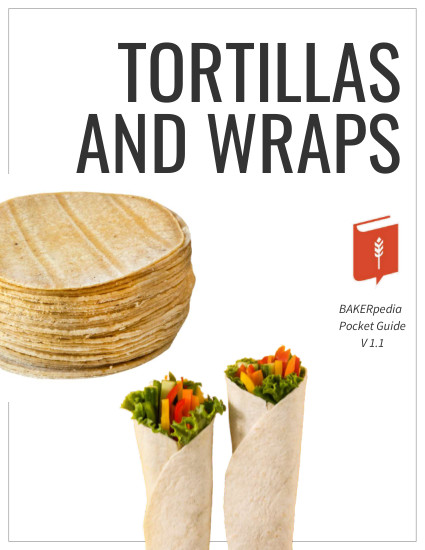A Baker’s Guide to Tortilla Production

Tortillas and wraps have become one of the most loved and fastest-growing segments in the baking industry. As consumers shift toward healthier and more convenient food options, the global tortilla market is expanding rapidly. However, to stay competitive, bakers need to master the technical aspects of production to deliver quality products that meet evolving consumer preferences. Join us as we share some insights from our recent “Tortillas and Wraps” BAKERview seminar.
What Defines Tortillas and Wraps?
At their core, tortillas and wraps are unleavened, flat products made from either corn or wheat flour. The dough is flattened into a circular shape and then cooked. Depending on the ingredients and production methods used, the final product can vary widely in texture, flavor, and flexibility. As the demand for health-conscious alternatives grows, bakers are producing a variety of tortillas, including:
- Flour tortillas – The most common type, known for its softness and flexibility.
- Corn tortillas – A traditional staple in Mexican cuisine, often more robust and flavorful.
- Gluten-free tortillas – Made from alternative flours like rice or sorghum to cater to those with gluten sensitivities.
- Keto or low-carb tortillas – Typically made with almond or coconut flour, offering a low-carb option for health-conscious consumers.
The Key Ingredients and Their Functions
Successful tortilla production relies on the right combination of ingredients, each serving a specific function that affects the structure, texture, and shelf-life of the final product.
- Flour (Wheat or Corn): Provides the primary structure of the tortilla. Wheat flour offers elasticity due to gluten, while corn or gluten-free flours need binders to achieve similar flexibility.
- Water: Hydrates the flour and controls water absorption, which influences the texture and overall consistency of the dough.
- Fat (Shortening, Oil, or Lard): Acts as a release agent and enhances flavor, while providing the pliability and flexibility needed for wraps that won’t tear when folded.
- Yeast & Leavening Agents: Though many tortillas are unleavened, some recipes use yeast or baking powder to create gas, adding a fluffy texture to thicker varieties.
- Emulsifiers: Improve dough texture, uniformity, and extensibility. They also enhance softness, which is crucial for rollability and consumer appeal.
- Dough Relaxers (Mix Reducers): Help soften the dough, improving its machinability during the production process.
- Enzymes: Facilitate better dough handling, enhance mixing tolerances, and improve crumb texture.
- Fiber: Adds nutritional value to the tortilla while influencing texture. Increasing fiber content aligns with consumer demand for healthier products.
- Acids (pH Adjusters): Adjust the pH to extend shelf-life and improve the stability of the product.
- Mold Inhibitors: Prevent mold growth, with sorbic acids and propionates being common. Label-friendly options like cultured wheat or raisin juice are available for cleaner labels.
Tortilla Production Methods: Hot-Press vs. Die-cut
- Hot-Press Method:
This method accounts for over 90% of retail tortillas. It produces tortillas that are smooth, elastic, and slightly chewy, with great resistance to tearing and cracking. However, it requires a more relaxed dough, often needing dough conditioners to ensure the correct consistency.
- Die-Cut Method:
This method extrudes tortilla dough to 0.5–2.5 mm thickness and then cuts it into individual rounds. It is more cost-effective due to high throughput but can lead to shrinkage in the final product if the dough is too elastic. To compensate, cutters are often slightly oblong to ensure round tortillas post-baking.
Ensuring Consistency in Tortillas and Wraps
Maintaining the quality of tortillas and wraps is critical for consumer satisfaction. Quality control measures should be monitored:
- Physical properties: pH adjustment, water absorption, starch damage, and rollability.
- Visual properties: Diameter, color, stack height, toast marks, and any unwanted pockets.
Curious to learn more? Watch the BAKERview here:
Start Producing Delicious Tortillas and Wraps Today
The tortilla and wrap market offers significant growth potential for commercial bakers who are prepared to innovate. By understanding the key ingredients, mastering the production process, and ensuring rigorous quality control, bakers can produce tortillas that meet the demands of today’s health-conscious consumers. For even more technical guidance, don’t forget to download our Tortilla and Wraps Pocket Guide, your go-to resource for troubleshooting and enhancing your tortilla production process!

Want to stay up-to-date with BAKERpedia? Sign up for our newsletter today!

